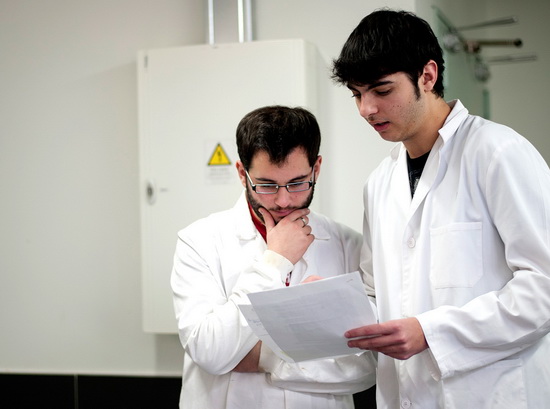
Objectives
The main objectives of the Degree in Chemistry are:
*To foster an interest in Chemistry among students, enabling them to value its applications in various contexts, and involve them in a stimulating and satisfying experience.
* To provide students with solid and balanced foundations of chemistry knowledge and practical skills.
* To develop the students' ability to apply their theoretical and practical knowledge of Chemistry to problem solving in this field.
* To develop a series of valuable abilities in Chemistry and in other contexts by means of education in chemistry.
* To provide students with the fundamental knowledge and skills to enable them to continue their training in specialised and multidisciplinary areas.
* To promote students' ability to value the importance of chemistry in industrial, economic, environmental and social contexts.
Competences
To achieve these objectives, students must be capable of mastering the main terminology, nomenclature, conventions and units in Chemistry; the characteristics of the different states of matter and theories to describe them; the main types of chemical reaction and their associated characteristics; the principles of thermodynamics and their applications in Chemistry; chemical elements and their compounds, as well as how to obtain them, their structure, reactivity and characteristics; analysis techniques and applications; unit operations in chemical engineering; chemical process metrics, including quality management; relations between macroscopic characteristics and individual atomic and molecular characteristics, including polymers, colloids and other materials; the structure and reactivity of the main molecule types and the chemistry of the main biological processes.
Structure and credits
| SUBJECT TYPE | ECTS |
|---|---|
| Basic training (B) | 60,0 |
| Obligatory (Ob) | 120,0 |
| Optional (Opt) | 48,0 |
| Degree Final Project (Ob) | 12,0 |
| TOTAL CREDITS | 240,0 |
Student profile
To achieve these objectives, students must be capable of mastering the main terminology, nomenclature, conventions and units in Chemistry; the characteristics of the different states of matter and theories to describe them; the main types of chemical reaction and their associated characteristics; the principles of thermodynamics and their applications in Chemistry; chemical elements and their compounds, as well as how to obtain them, their structure, reactivity and characteristics; analysis techniques and applications; unit operations in chemical engineering; chemical process metrics, including quality management; relations between macroscopic characteristics and individual atomic and molecular characteristics, including polymers, colloids and other materials; the structure and reactivity of the main molecule types and the chemistry of the main biological processes.
Professional opportunities and officially regulated professions
Chemistry graduates are in great demand in recent job placement reports. More than half of the posts offered are in the chemicals sector, including the manufacturing and distribution of chemical products and pharmaceutical specialisations. Other fields where professionals with this degree are in significant demand include: hospitals, food and drink sectors, research, general services, health, glass and ceramics. Education is also an option, and in recent years, professional activities related to the environment and new technologies have become important.
First academic year taught
Course 2008/09 FIRST YEAR
Course 2009/10 FIRST AND SECOND YEAR
Course 2010/11 FIRST, SECOND AND THIRD YEAR
Course 2011/12 FIRST, SECOND, THIRD AND FOURTH YEAR
Academic Staff
Information leaflet
More information
- Teaching centre: Faculty of Sciences
- Official State Bulletin publication date: 13/06/2009
- Number of places available: 90
- Type of teaching: CLASSROOM
- Language of instruction: SPANISH
- First Academic year taught: 2008-09
Subjects, timetables and examinations
Study plan /of adaptation to the degree / Recognition of credits
External practicums
Final Project
International Programmes and Exchanges
Movilidad nacional
Registration
Antes de realizar la matrícula es imprescindible leer la información que figura en el apartado de planificación de la enseñanza y toda la información detallada siguiente:
Regístrate para obtener usuario y contraseña
Protección de datos personales
ACCESO AL PROGRAMA DE AUTOMATRÍCULA





